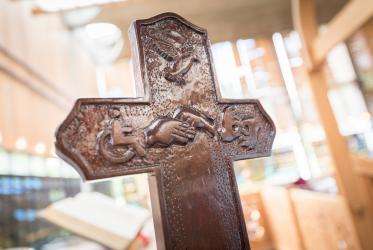The forum, organized by the Evangelical Lutheran Church in Tanzania, World Council of Churches (WCC) Ecumenical Disability Advocates Network, and Finnish Evangelical Lutheran Mission, an agency of the Evangelical Lutheran Church in Finland, assembled a series of talks from faith leaders, doctors, and organizations working to improve the rights of vulnerable women and girls.
Bishop Dr Frederick Onael Shoo, immediate former presiding Bishop of the Evangelical Lutheran Church in Tanzania, said it was important for women and young people— especially persons with disabilities—to be aware of the opportunities that influence in their lives, the services available to them and the right to bodily autonomy.
“Therefore, the sexual health of disabled women and girls should be brought up in the public debate. It should be underlined that social norms and the sexual and reproductive health and rights of women and young people with disabilities, as well as bodily integrity, require special attention,” said Shoo.
According to the bishop, this conclusion was drawn from church work with the Tanzania Federation of Disabled Person’s Organizations and the Selian Lutheran Hospital, which is setting up accessible sexual reproductive health services.
In the evening gathering, the partners exchanged views on the human rights of women and girls; how churches can help ease access to services for women and girls who have experienced female genital mutilation and other forms of violence, including women with disabilities; and on promoting positive norms and values in communities.
In addition to almost no access to services for persons with disabilities, the bishop said, social norms related to disability and gender often normalized violence faced by girls and women with disabilities in the communities.
“An emphasis should be on the benefits that can be achieved by promoting sexual and reproductive health and rights for society as a whole, and especially for women and girls with disabilities,” he said.
In Tanzania, the WCC Ecumenical Disability Advocates Network has been supporting the Selian Lutheran Hospital to make its sexual reproductive health services—which are predominantly delivered to members of the Maasai Indigenous community—inclusive, such that they accommodate persons with disabilities.
“Despite having the same rights and needs and being as sexually active as their peers, girls with disabilities have typically been excluded from accessing sexual and reproductive health [services] and rights,” said Remy Mnzava, project manager at the Selian Hospital.
Teressa Juhaninmäki, regional director of Finnish Evangelical Lutheran Mission, East Africa Region, urged all-out action to ensure that any girl, regardless of abilities or faith, could enter hospitals in a situation where they are pregnant, have faced sexual violence, or are in need of any sexual or reproductive health services.
“Faith leaders have the keys to change the societal norms and values so that this would materialize, as well as a wide service provision base, where to make this everyday practice,” said Juhaninmäki. “I congratulate the Evangelical Lutheran Church in Tanzania and Selian Hospital for showing the lead in this field in Tanzania. I hope that this is only a start towards a truly equal society.”
Recently, reports have emerged that women with disabilities in Tanzania were being forcefully or secretly sterilized, surgeries performed under the auspices of legitimate medical care.
“It our right to love and be loved. We also have the right to family. Do not sterilize us,” Happiness Koisianga, secretary of the Tanzania Federation of the Disabled Women Wing in Arusha told the forum.
Evangelical Lutheran Church in Tanzania (ELCT)
Ecumenical Disability Advocates Network (EDAN)






